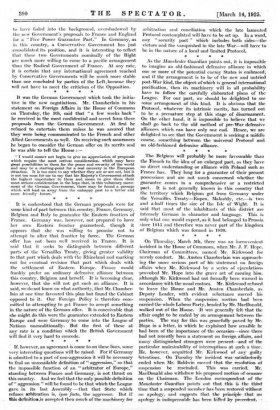On Thursday, March 5th, there was an inconvenient -incident in
the House of Commons,, when Mr. J. F. Hope, Chairman of Committees, named Mr. Kirkwood . for unruly conduct. Mr. Austen Chamberlain was approach- ing -the More serious- part of his statement on foreign affairs when . Mr. Kirkwood by a series of ejaculations -provoked Mr. Hope into the grave act of naming him, although Mr. Kirkwood had not formally been warned in accordance with the usual custom. Mr. Kirkwood- refused to leave the House and Mr. Austen Chamberlain, as Deputy Leader, with evident reluctance moved' his suspension. When the suspension motion had been carried the whole Labour Party, headed by Mr. MacDonald, walked out of the House. It was generally felt that the affair ought to be ended by an arrangement between the parties. The way for this was gracefully paved by Mr. Hope in a letter, in which he explained how sensible he had been of the importance of the occasion—since there had not recently been a statement on foreign affairs, and many distinguished strangers were present—and of the particular undesirability of interruptions at such a time. He, however, acquitted Mr. Kirkwood of any guilty intentions. On Tuesday the incident was- satisfactorily ended when Mr. Baldwin moved that the resolution at suspension be rescinded. This was carried. Mr. MacDonald also withdrew his- proposed- motion of censure on the Chairman. The London correspondent of the Manchester Guardian points out that this is the third time that a suspended member- has been-restored without an apology, and suggests that the principle that an apology is inclispensabre has been killed by precedent.














































 Previous page
Previous page